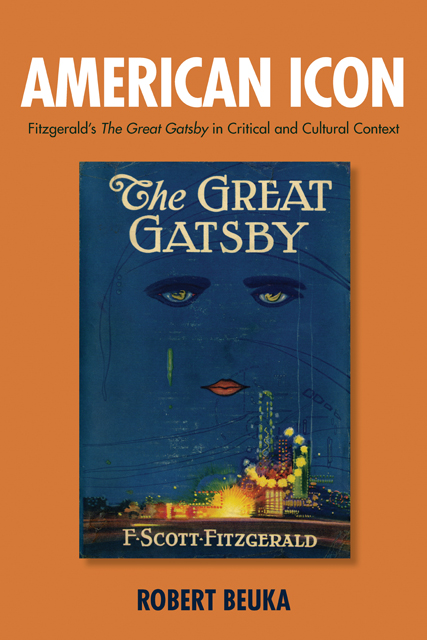Book contents
- Frontmatter
- Dedication
- Contents
- Preface
- 1 A Book of the Season Only: Early Reactions to The Great Gatsby
- 2 A Green Light: The “Fitzgerald Revival” and the Making of a Masterpiece, 1940–59
- 3 The Gatsby Industry: Tracing Patterns and Pushing Boundaries in the Criticism of the Sixties and Seventies
- 4 Gatsby, in Theory (and Out): New Paradigms in the Eighties and Nineties
- 5 Twenty-First-Century G: The Great Gatsby as Cultural Icon
- Works Cited
- Index
2 - A Green Light: The “Fitzgerald Revival” and the Making of a Masterpiece, 1940–59
Published online by Cambridge University Press: 11 February 2023
- Frontmatter
- Dedication
- Contents
- Preface
- 1 A Book of the Season Only: Early Reactions to The Great Gatsby
- 2 A Green Light: The “Fitzgerald Revival” and the Making of a Masterpiece, 1940–59
- 3 The Gatsby Industry: Tracing Patterns and Pushing Boundaries in the Criticism of the Sixties and Seventies
- 4 Gatsby, in Theory (and Out): New Paradigms in the Eighties and Nineties
- 5 Twenty-First-Century G: The Great Gatsby as Cultural Icon
- Works Cited
- Index
Summary
The Forties: Curtain up on the “Second Act”
ONE OF F. SCOTT FITZGERALD’S more famous and oft-quoted statements is an observation he jotted down amidst the working notes for his final, unfinished novel: “There are no second acts in American lives.” This observation is regularly exhumed and reused in our own day, by everyone from journalists to sportswriters to pop-culture bloggers, typically as a preamble to a story about some ephemeral newsmaker who has, after a period of obscurity, reemerged into the limelight. Some observation along the lines of, “Fitzgerald got it wrong!” will invariably be the cheeky rejoinder that then leads in to a tale of some nearly forgotten figure who, after his or her period lost in the wilderness, has returned to notoriety and credibility. This familiar story replays with consistency in our popular culture (see, for example, A&E’s “Biography” and every episode of “VH1’s Behind the Music”), perhaps as much because of its ratification of our culture of acceptance and forgiveness as for the reassuring familiarity of its glory-ruin-restoration narrative formula. There is a certain irony in Fitzgerald’s involvement in such stories, not only because he was an early example of a national pop-culture celebrity, even superstar, but also because he never quite did get to see the “second act” of his own life and career.
Indeed, this thought about “no second acts” is particularly apropos of Fitzgerald’s own life, if in a darkly ironic sense. The author’s meteoric ascent to literary stardom in the 1920s was followed, in the Depression years and in Fitzgerald’s own thirties and early forties, by an extended period of frustration, futility, and failure. After releasing three major novels, as well as many of his best short stories, between the ages of twenty-four and twenty-nine (culminating in the publication of The Great Gatsby in 1925), Fitzgerald would publish only one more completed novel (Tender Is the Night, 1934) in the final fifteen years of his life; additionally, the quality of some of his stronger stories and essays from this period was undercut by the large quantity of hastily written commercial stories he published in order to generate income.
- Type
- Chapter
- Information
- American IconFitzgerald's <i>The Great Gatsby</i> in Critical and Cultural Context, pp. 22 - 56Publisher: Boydell & BrewerPrint publication year: 2011



